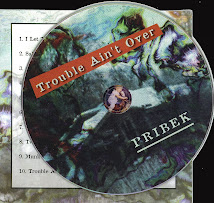Aha, "candid," I like that word. Somehow, somewhere, when you least expect, someone will walk up to you and say: "Sweat, we don't know why Wiki Leaked Ya..!"
Retrieved in Entirety for Ed Purposes by Pat Darnell
http://www.msnbc.msn.com/id/40404729/
WikiLeaks defies U.S. demands on leaked cables
250,000 documents provided to The New York Times, The Guardian of Britain and German magazine Der Spiegel
[Wikileaks founder Julian Assange listens during a news conference on the internet release of secret documents about the Iraq War, in London on Oct. 23.]
msnbc.com news services | updated 11/28/2010 1:48:01 PM ET
WASHINGTON — The online website WikiLeaks says it will go ahead with the release of hundreds of thousands of classified State Department documents in defiance of U.S. demands not to publish the files.
The WikiLeaks website appeared to be inaccessible, and WikiLeaks said in its Twitter feed that it was experiencing a denial of service attack. Nevertheless, WikiLeaks said that publications in the U.S. and Europe would print the leaked diplomatic cables even if it could not.
The group's founder, Julian Assange, also tells the U.S. ambassador to Britain that WikiLeaks won't bow to Washington's demands.
The Obama administration has been bracing for the release for the past week. Top officials have notified allies that the contents of the diplomatic cables could prove embarrassing because they contain candid assessments of foreign leaders.The State Department has warned that the expected release of classified U.S. documents would endanger countless lives, jeopardize American military operations and hurt international cooperation on global security issues.
The department's top lawyer urged Assange in a letter on Saturday to keep classified documents off the website, remove records of them from its database and return any material to the U.S. government.
Lawyer Harold Koh said the department has learned that WikiLeaks provided 250,000 documents to The New York Times, The Guardian of Britain and German magazine Der Spiegel.
The New York Times posted a story on the documents early Sunday.
The U.S. government, which was informed in advance of the contents, has contacted governments around the world, including in Russia, Europe and the Middle East, to try to limit any damage. Sources familiar with the documents say they include corruption allegations against foreign leaders and governments.
Koh wrote that publication of the documents would "place at risk the lives of countless innocent individuals" as well as military initiatives and cooperation between countries to confront problems from terrorism to pandemic disease.
 The lawyer also rejected what he said was Assange's request for more information about individuals who might be at risk from publication of the documents.
The lawyer also rejected what he said was Assange's request for more information about individuals who might be at risk from publication of the documents."We will not engage in a negotiation regarding the further release or dissemination of illegally obtained U.S. Government classified materials," Koh wrote.
Past releases by WikiLeaks, founded by Assange, an Australian-born computer hacker, contained sensitive information about the wars in Iraq and Afghanistan, which the United States had said compromised national security and put some people at risk.
Anticipating the fallout from the latest publication, U.S. Ambassador to Germany Philip Murphy wrote a letter to the German Sunday weekly Bild am Sonntag that the WikiLeaks revelations would be an embarrassment.
"Regrettably we will soon have something new to see: alleged confidential diplomatic messages from U.S. embassies around the world, including mine. It's hard to say what effect it will have, but it will at the very least be uncomfortable -- for my government, for those mentioned in the reports, and for me personally as American Ambassador to Germany."
The newspaper reported that some German politicians were severely judged in the reports.
On Friday, U.S. Ambassador to Iraq James Jeffrey told reporters he was worried about the documents coming out.
"WikiLeaks are an absolutely awful impediment to my business, which is to be able to have discussions in confidence with people," he said.
The State Department letter echoed concerns expressed by Admiral Mike Mullen, chairman of the U.S. military's Joint Chiefs of Staff, airing on CNN's "Fareed Zakaria GPS" on Sunday.
"I would hope that those who are responsible for this would, at some point in time, think about the responsibility that they have for lives that they're exposing and the potential that's there and stop leaking this information," Mullen said.
In October, WikiLeaks released nearly 400,000 classified U.S. military files chronicling the Iraq war.
In a Twitter message last week, WikiLeaks said its forthcoming document release would be seven times larger than the Iraq war cache. A person familiar with the documents said that comparison was based on the total number of words.
An item that was apparently posted prematurely, and then removed, from the Der Spiegel website over the weekend, said the new WikiLeaks cache constituted of just over 250,000 State Department cables and 8,000 "diplomatic directives."








No comments:
Post a Comment